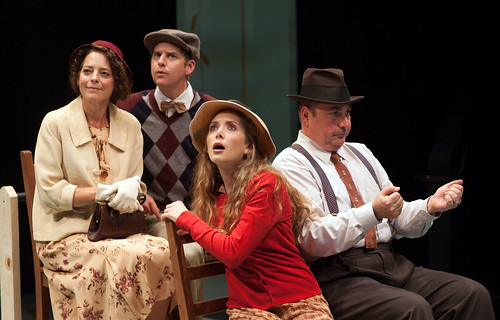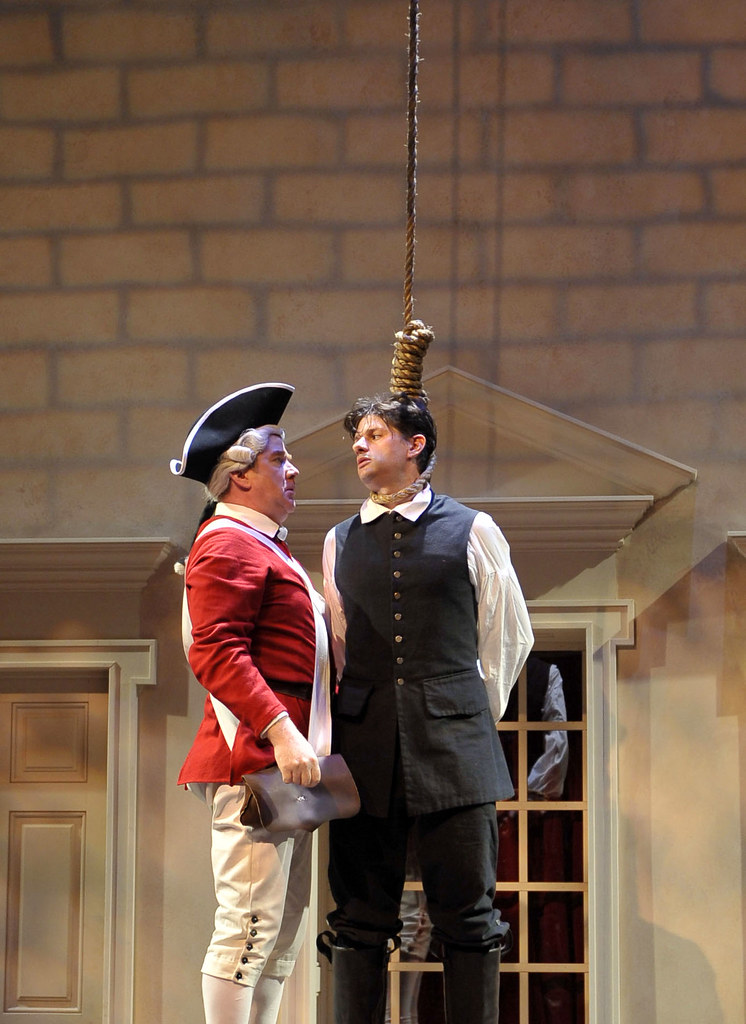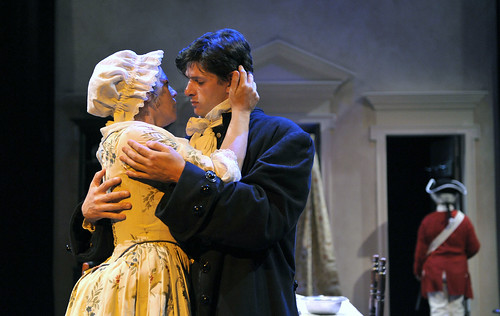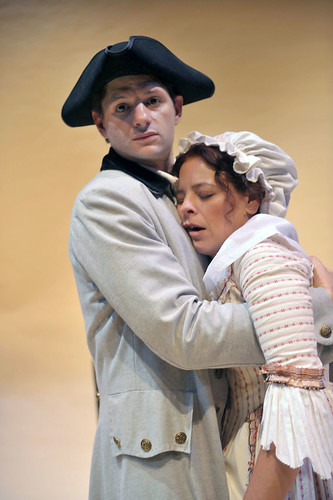
The family (from left, Stacy Ross, Patrick Russell, Heather Gordon) reads the billboards they pass as father (Søren Oliver) drives them through Trenton and Camden in “The Happy Journey to Trenton and Camden,” part of Aurora Theatre Company’s Wilder Times. Below: Infants Tommy (Patrick Russell, left) and Moe (Brian Trybom, right) discuss life in “Infancy,” the first play in the Wilder Times quartet. Photos by Jessica Palopoli
Of the four short Thornton Wilder plays that comprise Aurora Theatre Company’s Wilder Times, one is grating, one is darkly funny, one is poignant and one is so brilliant, so moving it almost erases the memory of the other three.
To begin with, these four one-acts were not written to be performed together, but director Barbara Oliver and her Aurora crew saw links between the first two, “Infancy” and “Childhood,” written in 1962, and “The Happy Journey to Trenton and Camden” and “The Long Christmas Dinner,” both written in 1931. Together, they form a sort of piquant portrait of human lives, beginning to end, with special attention given to family dynamics. It’s interesting that the plays more concerned with death and time were written first, and the plays dealing with our most formative years were written 30 years later.
“Infancy,” whose most notable feature is two man babies in giant prams, is the most outright comic piece of the evening, but it’s also grating in canny way. These babies (Patrick Russell and Brian Trybom are frustrated and upset, as babies often are. They can’t communicate properly with their mothers, so they break into loud, tough-talking brutes to get their message across.
Wilder’s dip into childhood grows murkier, and therefore more interesting, in “Childhood,” as the eldest of three siblings (Marcia Pizzo) concocts elaborate games for her younger siblings (Heather Gordon and Russell), the most involved being the one where they’re orphans after the accidental deaths of their parents. What begins as child’s play evolves into a dark dream in which mother (Stacy Ross) and father (Trybom) become actors in the death fantasies of their children. Kind of creepy, but really interesting.
Act 2 features Wilder’s two most famous short plays, and they’re full of the same kind of seemingly sentimental but actually quite trenchant and profound musings on human existence that make Our Town one of the best American plays ever written. In “The Long Christmas Dinner,” we watch one ever-changing, ever-evolving family sit down to Christmas dinner over 90 years in about 30 minutes. It’s a dazzling piece of writing full of life and death and grief and getting by. Children age from infancy to dotage, stories are told and re-told, traditions come and go, all beautifully performed by Oliver’s cast.
The stand-out here is “The Happy Journey to Trenton and Camden,” a simple story of a New Jersey mom, dad and two kids driving down state to see their married daughter/sister after an illness. That’s it for plot, but Wilder fills the play with stark emotion and powerful relationships. This apparently happy family has seen major loss, and there are raging currents of sadness running through their journey.
From the backseat, mom (Ross), keeps saying to her husband, (Søren Oliver) things like, “You know what’s best.” But no one in that car, including the son (Russell) and daughter (Gordon), believes that dad, sweet as he is, is the one who’s in charge. It’s all about mom. She loves this family of hers ferociously and is doing everything in her considerable powers to ensure their happiness, safety and general well being.
Ross’ performance is revelatory. This mother figure is as complicated and as admirable as any I’ve seen on stage. Even a small spat with the son ends up being a major emotional catharsis. And the reunion with the married daughter (an extraordinary turn by Pizzo) is fraught with grief and comfort and release.
Wilder demonstrates so powerfully that length matters far less than emotionally charged, expertly sculpted content. We can experience nearly a century of life and death in a half an hour and the full breadth and complexity of a flawed, functional, loving family in one quick road trip. It’s genius, and it’s great theater.
FOR MORE INFORMATION
Thornton Wilder’s Wilder Times continues through Dec. 9 at the Aurora Theatre Company, 2081 Addison St., Berkeley. Tickets are $35-$50. Call 510-843-4822 or visit www.auroratheatre.org.




 Gabriel Marin plays Dick Dudgeon, a self-proclaimed “devil’s disciple” who is reported to be a gambler, a swindler and one who runs with the gypsies. From what we know of Dick’s family – his piously pitiless mother (a wonderfully grumbly Trish Mulholland) and oafish brother (Anthony Nemirovsky) – it’s no wonder the man flew the family coop and embarked on a blasphemous life of crime and infidelity. He’s a proud reprobate, and his pride is evident in Marin’s every swagger and sideways grin.
Gabriel Marin plays Dick Dudgeon, a self-proclaimed “devil’s disciple” who is reported to be a gambler, a swindler and one who runs with the gypsies. From what we know of Dick’s family – his piously pitiless mother (a wonderfully grumbly Trish Mulholland) and oafish brother (Anthony Nemirovsky) – it’s no wonder the man flew the family coop and embarked on a blasphemous life of crime and infidelity. He’s a proud reprobate, and his pride is evident in Marin’s every swagger and sideways grin.
 The Aurora Theatre Company’s next show, George Bernard Shaw’s The Devil’s Disciple, is packed with the kind of actors who, if you care about local theater, you’ve been watching for years. Names such as Stacy Ross, Warren David Keith and Trish Mullholland pretty much make a show worth seeing if they’re involved.
The Aurora Theatre Company’s next show, George Bernard Shaw’s The Devil’s Disciple, is packed with the kind of actors who, if you care about local theater, you’ve been watching for years. Names such as Stacy Ross, Warren David Keith and Trish Mullholland pretty much make a show worth seeing if they’re involved.
 “I cannot thank my son enough,” Marin says. “He’s had to sit in a lot of green rooms. He’s the light of my life. What’s interesting, is when I bow, I make an `M’ with my hands, and if he’s in the green room, he’ll run out to the wings to see if I give him thanks. I couldn’t act if he wasn’t on board.”
“I cannot thank my son enough,” Marin says. “He’s had to sit in a lot of green rooms. He’s the light of my life. What’s interesting, is when I bow, I make an `M’ with my hands, and if he’s in the green room, he’ll run out to the wings to see if I give him thanks. I couldn’t act if he wasn’t on board.”


